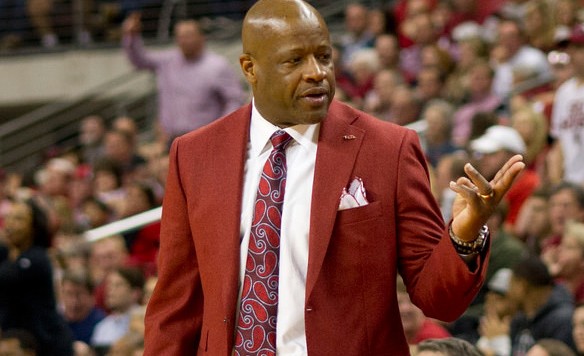Let’s not build the suspense in this episode of “CSI: RPI,” our continuing look at how the Ratings Percentage Index can so easily be manipulated and — in the process — overvalue a given team’s body of work.
On February 25, the Arkansas Razorbacks owned an RPI of 16 following a win over Texas A&M. You can check RPI ratings here — they will probably have been updated by the time you check this link.
Arkansas is the 16th-best team in the country, you say? There are only 15 teams better?
Let’s apply a quick test: If a team is No. 16 in the country, it is in line to get a No. 4 NCAA tournament seed if that rating is the sole basis of measurement or evaluation. As we’ve said in our RPI series, this is just one of many tools — it’s not the sole or even primary determinant of where a team is seeded. However, it does help the Selection Committee arrive at its choices in terms of seeding and bracketing.
So, Arkansas is a 4 seed? (Just play along.) That’s a relatively high seed — not in league with the Kansases and Arizonas and Villanovas on the top two seed lines, but in that next tier with Iowa State, Baylor, West Virginia, Louisville, Utah, and others.
A 4 seed? You must have done something pretty good. Naturally, the first thought would be that in an SEC bereft of high-quality teams except for one in Lexington, Arkansas must have managed to beat Kentucky, right?
Nope. Interestingly enough, Kentucky is the next team Arkansas will play, this Saturday on CBS. Arkansas has attained a top-20 RPI without even playing Kentucky yet.
Okay, so, I see that Arkansas played Iowa State. The Razorbacks must have won then against the Cyclones.
Nope. They lost, and moreover, they lost by 18.
Wait a minute, then: How did Arkansas get to this point? In the process of looking through the team’s complete resume, I notice that the Razorbacks lost at Clemson, a team outside the top 75 of the RPI. They lost at Florida and Tennessee, two other teams outside the top 75. This is a team considered No. 16 in America by the RPI on the afternoon of Feb. 25?
This begs for an explanation.
There are two really rich explanations to be advanced for why Arkansas is loved as it is by the RPI. The first is that — as you’ve seen in the examples of SMU and also VCU in prior installments of this series — scheduling at least two if not three really tough non-conference games will substantially boost your RPI, regardless of result. SMU didn’t beat Gonzaga or Indiana on the road, but it sure did schedule those two teams, by gum! VCU didn’t beat Villanova on a neutral floor or Virginia at home, but it sure played those teams, by golly! Instant RPI propulsion!
Arkansas, as we’ve said, scheduled a road trip to Iowa State. Where was the second really tough non-conference game on the Hogs’ slate? This team became a fortunate beneficiary of the fact that the very SMU team whose RPI is itself inflated was on the Hogs’ schedule as part of a home-and-home begun in 2013. (Arkansas beat SMU in Fayetteville.) Mike Anderson’s Razorbacks went into Dallas and beat SMU on Nov. 25, 2014. The RPI will say that’s a top-25 win. Basketball people would offer the opinion that if SMU played in a power-5 conference — not the cushy American Athletic Conference — it would probably have at least 10 overall losses and would be ticketed for the NIT. However, since we’re talking strictly numbers here, the RPI’s values indicate that “at SMU” is a high-quality win. Arkansas picked it off (even though SMU didn’t have Markus Kennedy available at the time).
Here’s the other explanation for why Arkansas’s RPI has remained so strong. It’s a dynamic somewhat akin to what we saw last year in the Pac-12, but with a twist.
In the 2014 Pac-12, various teams were able to pick off top-dog Arizona, boosting their NCAA chances. In the 2015 SEC, we’re not seeing anyone beat Kentucky, so from that vantage point, “productive cannibalism” isn’t occurring. However, there’s another form of productive cannibalism in a conference as far as maximizing NCAA tournament bids. You’re seeing it in the Big East and also the SEC this season. Teams 2 through 6 are trading wins in just the right proportion, balancing wins and losses such that everyone’s RPI boat stays afloat, generally inside the top 40 to 45, with no one plummeting to an unsafe depth.
Consider this example from the past week: Georgia was in trouble following losses to Auburn and South Carolina at home. Ole Miss, conversely, was in good shape after getting work done in wins against Mississippi State and Tennessee. Ole Miss was on the especially good side of the bubble heading into Wednesday night’s home game against Georgia. The Rebels needed that win, but they did not need it nearly as much as Georgia did. The Bulldogs won. That’s a perfect illustration of productive cannibalism in a conference: The team that needs a game slightly to moderately more than its opponent for bubble purposes is the team that wins the game. That’s been happening a lot in the SEC this season. This is why, in the RPI rankings linked to above, you’ll see lots of SEC bubble teams in the top 40.
Arkansas, then, has picked off many of those teams. What seems like a resume that should be viewed a lot more skeptically — an SEC resume without a result over Kentucky (due to not having played the Wildcats just yet) — is, in the eyes of the RPI formula, robust and substantial.
Arkansas has found its own way to cook the RPI’s special sauce… with a hickory-smoked pork flavor that stays on your tongue.
Woo-Pig-Sooie!

